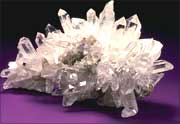In what might transform the Afghan economy and change the direction of the war, geologists have discovered nearly $1 trillion in untapped mineral deposits in the country, exceeding all previous expectations.
The discovery includes huge deposits of iron, copper, cobalt, gold and lithium.
 The discovery is so big that it might turn Afghanistan into one of the biggest mining centres in the world, and could fundamentally transform the Afghan economy and the war itself, senior US officials said.
The discovery is so big that it might turn Afghanistan into one of the biggest mining centres in the world, and could fundamentally transform the Afghan economy and the war itself, senior US officials said.
An internal Pentagon memo states that with the realisation of the potential of the minerals, Afghanistan could become the "Saudi Arabia of lithium," a key raw material in the manufacture of batteries for laptops and Blackberries, the New York Times said.
Setting up a mining industry could still take time but the vast reserves are expected to attract huge investments even before mines are profitable, which could lead to creation of jobs and fundamentally change the direction of the war.
"There is stunning potential here," Gen David H Patreus, commander of the US Central Command, told the paper.
"There are a lot of ifs, of course, but I think potentially it is hugely significant."
Afghan President Hamid Karzai has recently been briefed on the findings, which was made by American geologists and Pentagon officials.
"This will become the backbone of the Afghan economy," said Jalil Jumriany, an adviser to Afghan minister of mines.
But, at the same time, the new discovery could lead the Taliban to fight even harder to regain control over the area and the newly discovered mineral deposits.
Already rampant corruption inside Afghan government could also escalate along with a tug-of-war between the authorities in Kabul and provincial tribal leaders.
The Times pointed out that the national mining law has not yet been seriously challenged.
"No one has tested that law; no one knows how it will stand up in a fight between the central government and the provinces," said Paul A Brinkley, undersecretary of defense and leader of the Pentagon team that discovered the deposits.
There is a very real possibility that China will dominate the development of the Afghan mineral deposits, which the US will guard against because of its heavy investment in the region.
India, which has invested $1.3 billion in building vital civil infrastructure, develop human resources and capacity in areas of education, health, agriculture, rural development, also has high stakes in the country.
During the visit of Foreign Minister S M Krishna to Washington, earlier this month, top US diplomats including Secretary of State Hillary Clinton welcomed India's role in the reconstruction and development projects.
"Both sides pledged to explore opportunities for coordination on civilian assistance projects that advance Afghan self-sufficiency and build civilian capacity," a joint statement said.
"Afghanistan's success is vital for the security and stability of the region."
Another concern is the lack of know-how in Afghanistan about environment protection.
"The big question is, can this be developed in a responsible way, in a way that is environmentally and socially responsible?" Brinkley said.
"No one knows how this will work."





